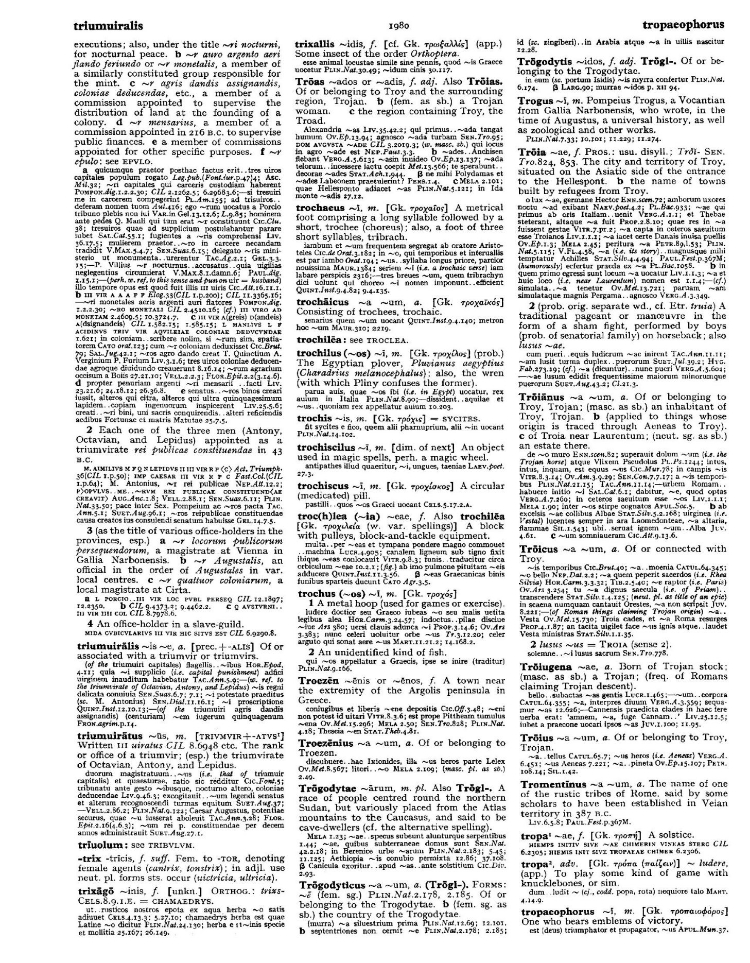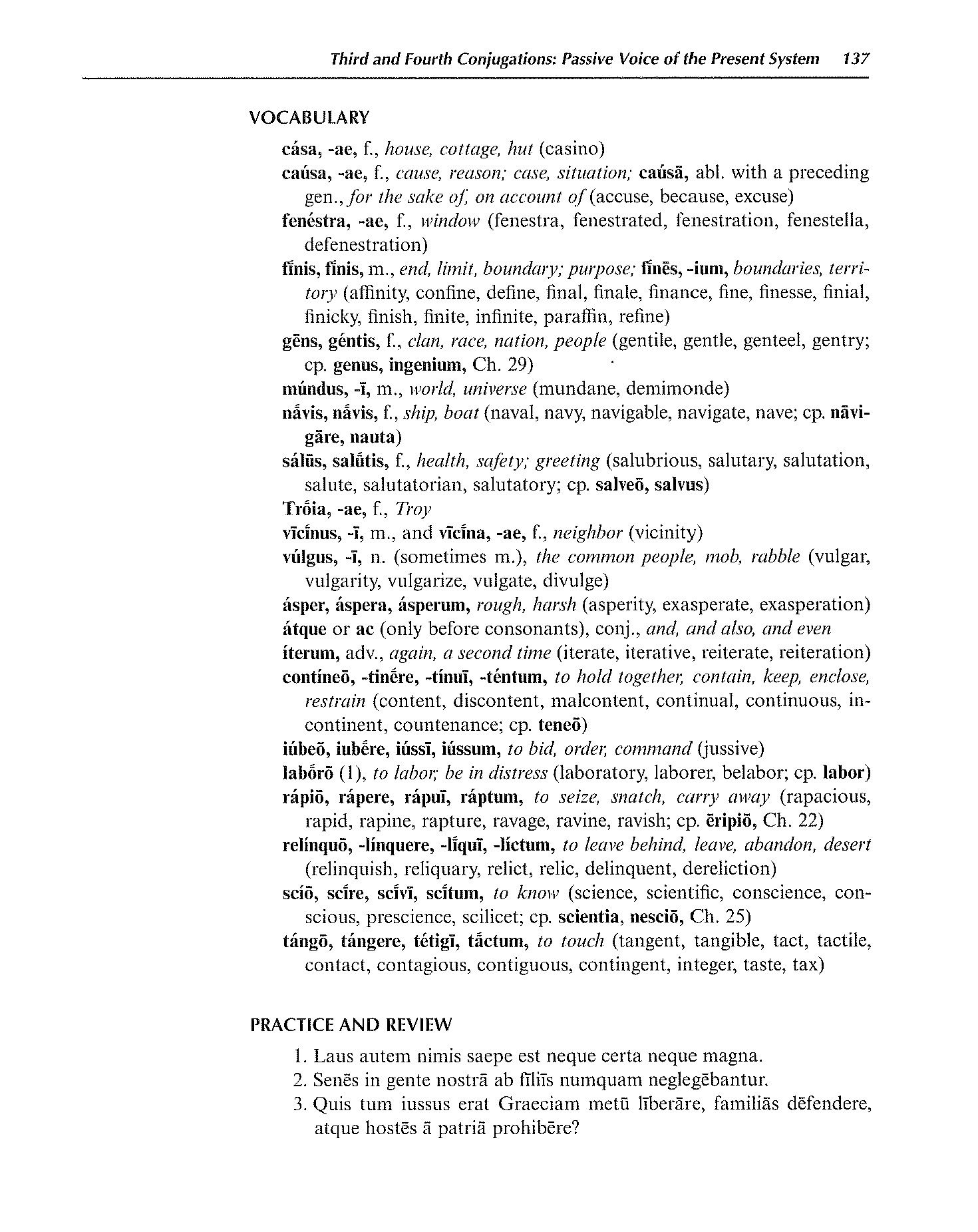
page_listing.tpl
page_subListingDetails.tpl
sub_listingDetails_style1.tpl
sub_listingDetails.title.tpl
Troia Troy
Troia is a Latin Noun that primarily means Troy.
Definitions for Troia
Wheelock's Latin
Noun
- 1
Troy
Oxford Latin Dictionary
Noun
- 1
The city and territory of Troy, situated on the Asiatic side of the entrance to the Hellespont. (b) the name of towns built by refugees from Troy.
- 2
(prob. orig, separate wd., cf. Etr. truia) A traditional pageant or maneuvre in the form of a sham fight, performed by boys (prob. of senatorial family) on horseback; also lusus ~ae.
Sentences with Troia
Latin to English
Arma virumque cano, Troiae qui primus ab oris Italiam fato profugus Laviniaque venit litora - multum ille et terris iactatus et alto vi superum, saevae memorem Iunonis ob iram. [Aenis, I, 1]Compare I tell about war and the hero who first from Troy's frontier displaced by destiny, came to the Lavinian shores, to Italy - a man much travailed on sea and land by the powers above, because of the brooding anger of Juno.
O terque quaterque beati, quis ante ora patrum Troiae sub moenibus altis contigit oppetere!Compare Oh, thrice and four times blessed you whose luck it was to fall before your father's eyes under Troy's battlements!
Vis audire illum tanta brevitate dicentem, ut artari magis et contrahi brevitas ipsa non possit? "Et campos, ubi Troia fuit": ecce paucissimis verbis maximam civitatem hausit et absorpsit, non reliquit illi nec ruinam.Compare Notice how he speaks with such brevity that brevity itself could not be more concise, more compact. "The plain where Troy once stood." This is how in a very few words he levels and annihilates a very great city, leaving not even a ruin.
In qui primus egredior locus, Troia voco.Compare The first place at which they landed is called Troy.
Data sources
Notes
- Definitions
- Frederick M. Wheelock, Wheelock's Latin, 6th ed., rev. Richard A. LaFleur (New York, NY: HarperCollins Publishers, 2005): 137.
- P. G. W. Glare, Oxford Latin Dictionary, Vols. 1-8 (Oxford: Clarendon Press, 1982): 1980.
- Word frequencies
- Paul B. Diederich, The Frequency of Latin Words and Their Endings, PhD diss., (Columbia University, 1939).
Bibliography
Allen, Joseph H. Allen and Greenough's New Latin Grammar for Schools and Colleges: Founded on Comparative Grammar. Edited by James B. Greenough, George L. Kittredge, Albert A. Howard, and Benjamin L. D'Ooge. Boston, MA: Ginn & Company, 1903.
Crystal, David. A Dictionary of Linguistics and Phonetics. 6th ed. Oxford, UK: Blackwell Publishing, 2008.
Delatte, Louis, Suzanne Govaerts, Joseph Denooz, and Etienne Evrard. Dictionnaire fréquentiel et index inverse de la langue latine [Frequency Dictionary and Inverse Index of the Latin Language]. Liège, Belgium: Laboratoire d'analyse statistique des langues anciennes de l'Université de Liège (L.A.S.L.A.), 1981.
Diederich, Paul B. The Frequency of Latin Words and Their Endings. PhD diss., Columbia University, 1939.
Francese, Christopher. "Latin Core Vocabulary." Dickinson College Commentaries. Last modified 2014. http://dcc.dickinson.edu/latin-vocabulary-list.
Gildersleeve, Basil L., and Gonzales Lodge. Gildersleeve's Latin Grammar: Third Edition, Revised, and Enlarged. 3rd ed. London, England: Macmillan and Co., 1903.
Glare, Peter G.W. Oxford Latin Dictionary. Vols. 1-8. Oxford, England: Clarendon Press, 1982.
Krüger, Bernd. "Latin Conjugation Tables." Cactus2000. Accessed May 5, 2023. https://latin.cactus2000.de/index.en.php.
Pierson, Nick. "Sound of Text." Accessed October 26, 2019. https://soundoftext.com.
Wheelock, Frederick M. Wheelock's Latin. 6th ed. Revised by Richard A. LaFleur. New York, NY: HarperCollins Publishers, 2005.
Wiktionary Contributors. "Victionarium." Wikimedia Foundation, Inc. Updated March 18, 2019. https://la.wiktionary.org/wiki/Victionarium:Pagina_prima.
Citation
Chicago (17th ed.)
Allo Contributors. "Troia, Troiae (n.) - Latin Word Definition." Allo Latin Dictionary. Last modified . Accessed January 30, 2026. http://ancientlanguages.org/latin/dictionary/troia-troiae.
Entry created on . Last updated on .







